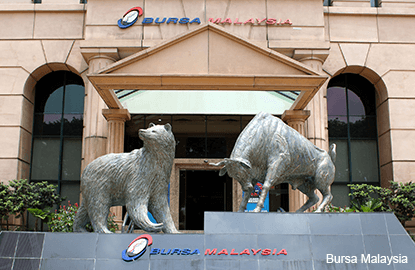
This article first appeared in The Edge Financial Daily, on July 25, 2016.
KUALA LUMPUR: Bursa Malaysia Bhd, which is set to be the single approving authority for all secondary securities-based fundraising by listed issuers, could adopt an improved governance structure — hot on the heels of the Singapore Exchange’s (SGX) July 18 announcement to transfer its regulatory unit into a new subsidiary (RegCo) with a separate board.
It is understood that the Securities Commission of Malaysia (SC) is in favour of the stock exchange operator making clearer segregation of its regulatory role from its profit-chasing commercial activities. Bursa Malaysia, however, is undecided as it might have to give up powers that may be synergistic to its operations, industry sources say. When contacted, a Bursa Malaysia official declined to comment.
“The SC continues to work with the board of Bursa to progressively strengthen governance arrangements of the exchange, including ways to further strengthen the independence of the regulatory function, and will introduce appropriate changes, taking into account the evolution of market structures and the findings of the SC’s assessments,” an SC spokesman said without specifically saying what it would like Bursa to do going forward.
In its annual regulatory audits and periodic assessments of Bursa Malaysia, the SC “focuses on the ability of the exchange to demonstrate that it has been independent and effective in carrying out the expected regulatory functions stipulated by the SC and as required by the law”.
“A demutualised and listed exchange is one which promotes independence of its regulatory function and maintenance of a proper balance between its public interest obligations and its commercial interests. There are various models of regulatory structure in an exchange but what is important is for the function to be carried out effectively,” the SC spokesman adds.
A well-structured regulatory unit could reduce the workload of primary regulators such as the SC, whom may be faced with funding constraints and rising expectations, experts say. It might also ease budget constraints. In FY2005, the SC had RM23.5 million deficit after income fell 9.6% year-on-year to RM177.9 million while expenses rose 7% to RM196.51 million. In comparison, Bursa Malaysia made RM198.6 million profits and paid out 93% of it as dividends last year. Dividend payouts have been above 90% of profits for at least the past five years, making it a steady dividend play for investors.
If Bursa Malaysia takes the SGX route, it would join self-regulatory organisations like the New York Stock Exchange (NYSE), which has a not-for-profit division, NYSE Regulation, and is also monitored by Finra, an independent organisation. To be sure, even the NYSE route has its faults.
Principally, though, Bursa Malaysia too would benefit from granting its regulatory unit independence, says Mak Yuen Teen, co-director of the Corporate Governance and Financial Reporting Centre and an associate professor at the National University of Singapore Business School.
“Bursa has already built in some regulatory features in its main board, such as having public interest directors. It also has wider powers, such as power to impose fines on directors, which SGX does not have, and has been transparent about enforcement actions for many years [for instance, through publication of enforcement statistics],” says Mak.
“But I think moving in this direction is a logical next step,” adds Mak, whose experience in Malaysia includes teaching the Iclif-organised Financial Institutions Directors’ Education programme for directors in Malaysia.
As RegCo is still an SGX subsidiary and funded by it, Mak reckons that several steps need to be taken to ensure that RegCo and its board is truly independent of its parent.
For one, RegCo needs to have a clear mandate and be well-resourced. It should also publish its annual report, which clearly shows resources, activities and achievements — including statistics on private and public enforcement actions.
Mak also reckons that the RegCo chief executive officer should not report to the SGX board but only to the independent RegCo board which in turn should have a reporting relationship with the Monetary Authority of Singapore (MAS). For Malaysia, the reporting relationship would be to the SC.
It is also important that RegCo board appointees be independent from the SGX board and have robust procedures to deal with any conflict of interest of board members, who may have client subject to regulatory action.
“MAS should preferably directly appoint some directors, particularly those who are supposed to be independent of the SGX board, rather than just approving appointees proposed by the SGX board,” says Mak, adding that the RegCo board should have composition that include regulatory expertise and investor representatives, not loaded with bankers, financial advisers, lawyers and accountants who work for listed companies.
The same would apply to Malaysia and other jurisdictions looking to have more explicit separation of the public interest regulatory functions from the public listed exchange operator with profit targets and shareholders wanting better returns. Otherwise, the changes might not have the desired public interest impact.
Concerns that certain regulatory safeguards are undermined when the people monitoring issuers are housed within a profit-seeking entity have been around since stock exchanges around the globe began demutualising in the 1990s. This is because stock exchange operators need to compete to attract and retain listings that help grow its earnings while being responsible for monitoring issuers from activities that might create more trading interest and profits for the exchange.
The Kuala Lumpur Stock Exchange was demutualised and renamed as Bursa Malaysia in 2004 and listed on the Main Board in March 2005. Bursa is set to release its 2Q earnings today.